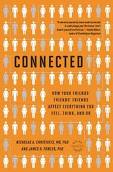
The authors offer a strong case against our longstanding reductionist bias towards individualism in health. It seems that the bigger picture and how we connect may be ultimately more important than who we are individually. This counterintuitive message supported by exhaustive clinical examples drives Connected and positions it as a critically important book. While I avoid the use of tired terms like ‘paradigm shift,’ it probably has a place when describing the book’s premise.
While well-referenced, Connected was heavy at times. I found myself desperate for a little more extrapolation from the authors – I wanted their ideas and interpretation more then their compulsively collected evidence.
The authors finish the book with a provocative view of how we might see ourselves in the near future:
The great project of the twenty-first century—understanding how the whole of humanity comes to be greater than the sum of its parts—is just beginning. Like an awakening child, the human superorganism is becoming self-aware, and this will surely help us to achieve our goals. But the greatest gift of this awareness will be the sheer joy of self-discovery and the realization that to truly know ourselves, we must first understand how and why we are all connected.
Overall I loved the book. I would recommend Connected for anyone serious about understanding how social networks influence behavior. For the simply curious it may be a bit heavy.
The link above to Connected is an Amazon Affiliate link